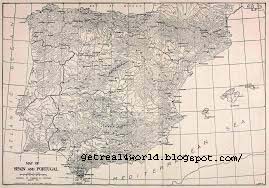- History of Spain is one of the most exciting in the world and Spanish history and culture has helped to condition today's world into what it is today. Though Spain is a relatively small territory found in south west Europe, the history of Spain features grandeur and is strikingly unlike that of the rest of the continent.
The timeline of Spanish background tells the story of a land that has been sought after by many civilizations: the Carthaginians and Romans fought over it, the Arabs overcome it and the Catholic monarchs would recover The country of spain and convert it into the most powerful disposition in the world upon the breakthrough of America. The Spanish Empire reached its top under King Felipe II, who unified the The spanish language territory and lands: from the Philippines to the Americas as well as Portugal, the Netherlands, Italy and some of present day Germany.
Following the Roman victory, Publius Cornelius Scipio, Africanus, started out the conquest of Spain, that has been to be under Roman rule for six centuries. Once the Peninsula experienced been completely subdued, it was Romanized to such an extent that it produced writers of the prominence of Seneca and Lucan and such eminent emperors as Trajan and Hadrian.
 Rome left in The country four powerful social elements: the Latin language, Both roman law, the municipality and the Christian religion. After the fall of the Roman Empire, the Suevi, Vandals and ( POLAND )
Rome left in The country four powerful social elements: the Latin language, Both roman law, the municipality and the Christian religion. After the fall of the Roman Empire, the Suevi, Vandals and ( POLAND )Alans joined Spain, nonetheless they were defeated by the Visigoths who, by the end of the 6th century, has occupied almost the entire of the Peninsula.
From this moment forward, Spain's historical past reached a period of monetary and political decadence that has been accompanied by both foreign and civil wars. The 19th century would mark an important part of The spanish language history with the loss of important Spanish territories and the collapse of the Spanish Empire. The independence achieved by Spanish territories in the Unites states, Cuba, Puerto Rico and the Philippines significantly shaped the world and modern The spanish language history.
 Browse through this Spanish history timeline of links to find out about the history of Spain and the role that The country has played in the "theatre" of world history. The more you understand Spain's history and culture, the faster you will adapt to life in Spain.
Browse through this Spanish history timeline of links to find out about the history of Spain and the role that The country has played in the "theatre" of world history. The more you understand Spain's history and culture, the faster you will adapt to life in Spain.In 1469, the marriage of the Catholic Monarchs, Isabella of Castile and Ferdinand of Aragon,
prepared the way for the union of the two kigdoms and marked the opening of a period of growing success for Spain, since during their reign, Granada, the last stronghold of the Arabs in Spain, was conquered and, at the same time, in the same historic year of 1492, the caravels sent by the Crown of Castile under the command of Christopher Columbus discovered America.
The Canary Islands became part of Spanish territory (1495), the hegemony of Spain in the Mediterranean, to the detriment of France, was affirmed with the conquest of the Kingdom of Naples, and Navarre was incorporated into the Kingdom.
 The next two centuries, the 16th and the 17th, witnessed the construction and apogee of the Spanish Empire as a result of which the country, under the aegis of the Austrias, became the world's foremost power, and European politics hinged upon it.
The next two centuries, the 16th and the 17th, witnessed the construction and apogee of the Spanish Empire as a result of which the country, under the aegis of the Austrias, became the world's foremost power, and European politics hinged upon it.
The War of Succession to the Spanish Crown (1701-1714) marked the end of the dynasty of the
Habsburgs and the coming of the Bourbons. The Treaty of Utrecht in 1713 formalized the British occupation of the Rock of Gibraltar, giving rise to an anachronistic colonial situation which still persists today and constitutes the only dispute between Spain and the United Kingdom. Sea of Pink
Habsburgs and the coming of the Bourbons. The Treaty of Utrecht in 1713 formalized the British occupation of the Rock of Gibraltar, giving rise to an anachronistic colonial situation which still persists today and constitutes the only dispute between Spain and the United Kingdom. Sea of Pink
In 1808 Joseph Bonaparte was installed on the Spanish throne, following the Napoleonic invasion, although the fierce resistance of the Spanish people culminated in the restoration of the Bourbons in the person of Fernando VII. In 1873, the brief reign of Amadeo of Savoy ended with his abdication, and the First Republic was proclaimed. However, a military pronunciamiento in 1875, restored the monarchy and Alfonso XII was proclaimed King of Spain. He was succeeded in 1886 by his son
Alfonso XIII, although his mother Queen Maria Cristina of Habsburg acted as regent until 1902, when he was crowned king.
Alfonso XIII, although his mother Queen Maria Cristina of Habsburg acted as regent until 1902, when he was crowned king.



This comment has been removed by a blog administrator.
ReplyDelete